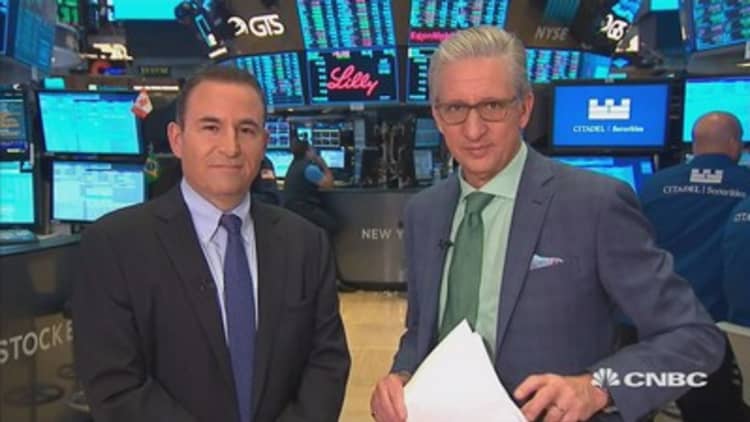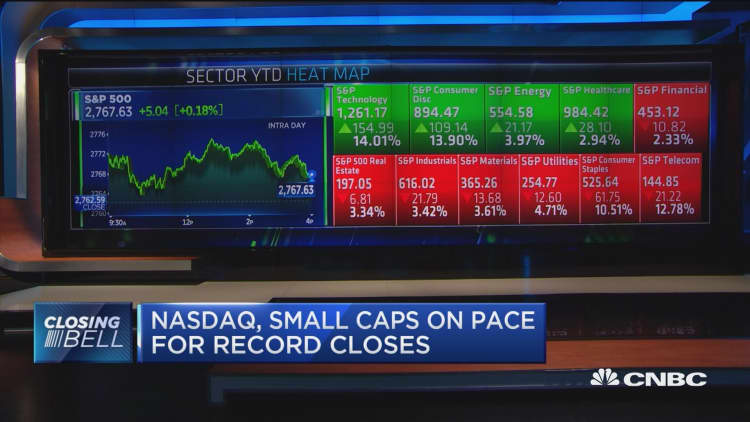
A little-known indexing event on Friday will likely result in the year's biggest volume day, with large trading and potential price swings in well-known names like Apple, Microsoft, J.P. Morgan, and Grubhub.
One of the world's largest index providers, FTSE Russell, is rebalancing the large-cap Russell 1000 and the small-cap Russell 2000 indexes. This is a significant annual market event because a lot of money tracks these indexes. Roughly $8 trillion is benchmarked to the Russell indexes, and $1 trillion is passively invested in funds that just attempt to track them. Nearly 10 percent of the money invested in the Russell 2000 is controlled by passive index funds, according to investment banking firm KBW, and when they make large-scale changes piles of money move around.
Call it the triumph of the indexers. More and more investors have moved into passive investments, investing in index funds tied to the the Nasdaq 100 or the Russell 2000, often using ETFs.
"It's a sign that indexers are becoming more important in global investment calculations," Alec Young, managing director, of global markets research for FTSE Russell, told me. "With more passive indexers the stakes are going up to make sure we get it right."

All that makes the reconstitution what traders call a "major liquidity event," meaning a lot of shares are going to change hands Friday. How many shares? The 2016 Russell reconstitution on June 24 of that year saw 6.7 billion shares change hands at the NYSE, three times normal volume and the largest volume day of the last three years. Last year's reconstitution on June 23 saw nearly 5 billion shares change hands, the second largest volume day of 2017.
Here's how it works:
Each year, Russell ranks the top 3,000 stocks (virtually the entire stock market universe) by market capitalization, then puts the top 1,000 in the Russell 1000 and the bottom 2,000 in the Russell 2000. Due to share buybacks and other events, many companies have either increased or decreased their market capitalization and so indexers will have to buy or sell shares in direct proportion to the increase or decrease in the index.
That means when you have a single day when all the stocks change their weighting in the index, heavy trading volume is going to occur.
Take Apple, which has been a buyback monster in the last few years. It will reduce its weighting in the Russell 1000 index, and there will be an estimated 2.7 million shares for sale at the close. Fortunately, that is only about 10 percent of the daily volume Apple trades, so the hope is that the price impact will be minimal.
J.P. Morgan has also been buying back stock and will see its share count reduced.
Jazz Pharmaceuticals
Some stocks will see significant volume. Trading firm ITG estimates that 800 securities will trade more than a full day's volume at or near the close, and 150 will need to buy or sell more than 10 days' worth of volume.
Jazz Pharmaceuticals, a hot biotech company that was previously domiciled in Ireland and is now included as a U.S. company, is going directly into the Russell 1000 without ever being in the Russell 2000. Indexers will need to buy 2.3 million shares, which is more than five times a full day's volume, according to ITG.
Even more significant moves come when a company goes into or out of the indexes. Some companies have increased in value and are going from the Russell 2000 into the Russell 1000.
A good example: Grubhub, which has gone from $43 to $113 in the past year and has increased its shares outstanding.
That means everyone who owned Grubhub in the Russell 2000 is going to sell it, and everyone who is indexed to the Russell 1000 is going to buy it. The net result: ITG estimates that Grubhub will see volume of about 3.8 million shares — about three times its normal volume.
What does it mean for Grubhub? It sounds like good news, and it is. But there is far more money indexed to the Russell 2000 than to the Russell 1000, so those selling it in the Russell 2000 have more to sell in dollar terms than those buying it in the Russell 1000. The bottom line: Grubhub will be for sale at the close.
Other companies going into the Russell 1000 from the Russell 2000 will also have stock for sale at the close: biotech firms Exact Sciences and Bluebird Bio and software firm Aspen Technology have either increased their share count significantly or have had big moves up in the last year and are graduating to the large-cap index.
The players
Does having stock for sale automatically mean the stock will drop? No. In fact, a small army of traders are perfectly aware of what is happening and will be seeking liquidity on the other side.
There's three main players in this game: 1) fundamental asset managers who are just looking to make sure nothing goes weird with their stocks, 2) index managers who want to make sure they track their benchmark, and 3) short-term traders who are looking to make a quick buck by buying or selling stuff that the index managers need.
The good news: Over the years, as trading has become ever more automated, there have been fewer price dislocations due to the reconstitution.
The bad news: Weird stuff still happens. Last year, for example, Whiting Petroleum increased its weighting in the Russell 1000 by a relatively modest amount (5.9 million shares), but dropped 11 percent at the close. Alcoa also had a modest increase in its share weighting and saw a 5.8 percent decline. Food giant Sysco saw a modest decline in its share weighting but dropped 9.5 percent.
That's what I'll be looking for at the close.
Alec Young, managing director of global markets research for FTSE Russell, will join us on Closing Bell at 3 p.m. ET.


